Academic Freedom, CIA Sponsored Terror, Criminalizing Dissent, Crony Capitalism, Gaza, Human Rights, Prison Industry, War Resister
Podcast: Play in new window | Download
Update: Co-host Michael Smith’s Parrot Charlie Turns 25
—-

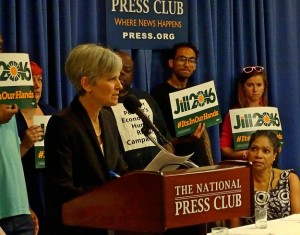
Green Party 2016 US Presidential Candidate Dr. Jill Stein
Jill Stein is a physician and activist who is seeking the Green Party’s 2016 presidential nomination. She ran for the White House as the Green Party’s candidate in 2012, winning nearly half a million votes. Stein is a graduate of Harvard College and Harvard Medical School.
Her campaign website urges: It’s time to build a people’s movement to end unemployment and poverty; avert climate catastrophe; build a sustainable, just economy; and recognize the dignity and human rights of every person. The power to create this new world is not in our hopes; it’s not in our dreams — it’s in our hands.
Guest – Dr. Jill Stein, was the Green Party’s 2012 candidate for president of the United States. She is an organizer, physician, and pioneering environmental-health advocate. She has led initiatives promoting healthy communities, local green economies and the revitalization of democracy – addressing issues such as campaign finance reform, green jobs, racially-just redistricting, and the cleanup of incinerators, coal plants, and toxics. She was a principal organizer for the Global Climate Convergence for People, Planet and Peace over Profit. Dr. Jill Stein is a mother, physician, longtime teacher of internal medicine, and pioneering environmental-health advocate. She is the co-author of two widely-praised reports, In Harm’s Way: Toxic Threats to Child Development, published in 2000, and Environmental Threats to Healthy Aging, published in 2009. The first of these has been translated into four languages and is used worldwide. The reports promote green local economies, sustainable agriculture, clean power, and freedom from toxic threats.
—-
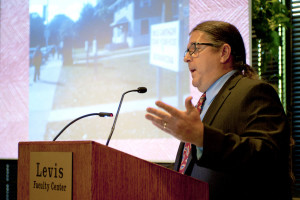
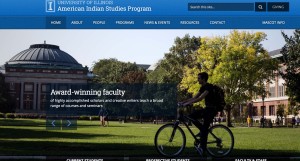
Department of American Indian Studies at the University of Illinois Reduced From Nine To Zero
Professor Robert Warrior is the departing chairman of the Department of American Indian Studies at the University of Illinois. Warrior is a member of the Osage Indian tribe of Oklahoma. He was the chairman of the department that help recruit Professor Steven Salaita to the University of Illinois in 2014. Salaita gave up his tenure in Virginia and was moving to University of Illinois when he was openly critical of the Israeli bombing of Palestinians in Gaza. For this, his tenured position at the University of Illinois was revoked. In the wake of Salaita’s firing, the Department of American Indian Studies at the University of Illinois had dwindled down to zero people from the nine it had just two years ago.
Guest – Professor Robert Warrior is Director of American Indian Studies at the University of Illinois at Urbana-Champaign, where he is Professor of American Indian Studies, English, and History. An enrolled member of the Osage Nation, he is the author of The People and the Word: Reading Native Nonfiction, American Indian Literary Nationalism (with Craig Womack and Jace Weaver), Like a Hurricane: The Indian Movement from Alcatraz to Wounded Knee (with Paul Chaat Smith) and Tribal Secrets: Recovering American Indian Intellectual Traditions. He is also a member of the Native Critics Collective, which published Reasoning Together, a collection of essays focused on Native literary criticism.
Members of the Native American and Indigenous Studies Association selected both The People and the Word and Reasoning Together for its list of the ten most influential books in Native and Indigenous studies in the first decade of the twenty-first century. He and the coauthors of American Indian Literary Nationalism were the inaugural recipients of the Beatrice Medicine Award for Scholarly Writing from the Native American Literature Symposium, and Warriorhas also received awards from the Gustavus Myers Foundation, the NativeAmerican Journalists Association, the Church Press Association, and others.
————————————————————————–
Academic Freedom, CIA Sponsored Terror, Civil Liberties, Criminalizing Dissent, Crony Capitalism, Habeas Corpus, Human Rights, Surveillance, Targeting Muslims, War Resister
Podcast: Play in new window | Download
Update:
—-

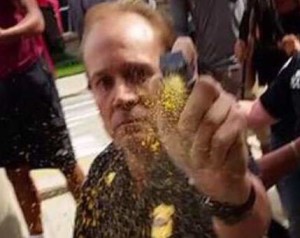
Black Women, LGBT And Police Abuse
Attorney Andrea Ritchie has dedicated the past two decades to challenging abusive and discriminatory policing against women, girls, and lesbian, gay, bisexual, and transgender people of color. An accomplished litigator, she is a highly-respected commentator –and recent Soros Fellow– on policy reforms and litigation strategies addressing the ways in which discriminatory policing impacts women of color.
Guest – Andrea Ritchie is the co-author of Queer (In)Justice: The Criminalization of LGBT People in the United States (published in 2011) and Caught in the Net, a report on women and the so-called war on drugs. She works closely with a range of local and national organizations, including Streetwise & Safe, an organization focused on policing of LGBT youth of color, and is a member of INCITE! She is also involved in #SayHerName, a gender-inclusive racial justice movement that campaigns against police brutality and anti-Black violence against black women. It aims to highlight the gender-specific ways in which police brutality and anti-Black violence disproportionately affect black women, especially black queer women and black trans women. Andrea’s Website.
—-
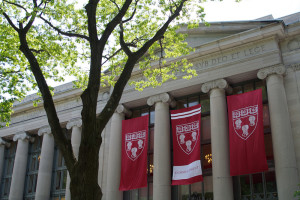

Milbank Changes Course on $1M Harvard Law School Gift after Pro-Palestine Event
Today we explore a controversy that has erupted at Harvard Law School when a prominent law firm, Milbank Tweed, discontinued a $1million grant it had given to the school after it learned that its donation helped pay for a panel on Palestine. We’ll talk to the Harvard Law Student who organized the event, who will explain how students on campuses across the country have been met with fierce efforts to suppress discussion of Palestinian rights.
————————————————————-
CIA Sponsored Terror, Civil Liberties, Criminalizing Dissent, Crony Capitalism, Habeas Corpus, Human Rights, Political Prisoner, Prison Industry, Surveillance, Targeting Muslims, Torture, Truth to Power
Podcast: Play in new window | Download
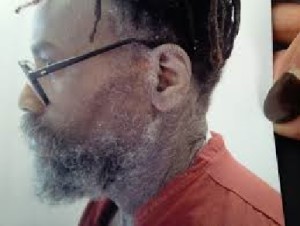
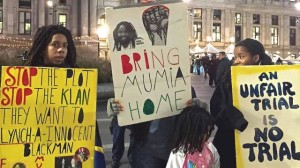
Mumia Abu-Jamal Lawsuit Update
Mumia Abu-Jamal has gone to federal court in Scranton, Pennsylvania to get an order compelling the state of Pennsylvania to provide him with medical care for Hepatitis C. Mumia has suffered symptoms of slurred words, elephants skin, scales and bloody cracks in his skin on 90 percent of his body. Other symptoms include extreme weakness, swelling of his limbs and loss of mental acuity. Mumia Abu-Jamal is being represented by Bret Grote of the Abolitionist Law Center and by Robert Boyle a National Lawyers Guild lawyer and prisoner’s rights advocate.
Guest – David Lindorff, is an American investigative reporter, a columnist for CounterPunch, and a contributor to Businessweek, The Nation, Extra! and Salon.com. His work was highlighted by Project Censored 2004, 2011 and 2012. Born in 1949, Lindorff lives just outside Philadelphia. He currently writes for ThisCantBeHappening.
—-


The General’s Son, Journey of an Israeli in Palestine
Miko Peled is an Israeli writer and activist living in the US. He was born and raised in Jerusalem. His father was the late Israeli General Matti Peled. Driven by a personal family tragedy to explore Palestine, its people and their narrative. He has written a book about his journey from the sphere of the privileged Israeli to that of the oppressed Palestinians. Peled speaks nationally and internationally on the issue of Palestine. He supports the creation of a single democratic state in all of Palestine, and a firm supporter of BDS.
—-
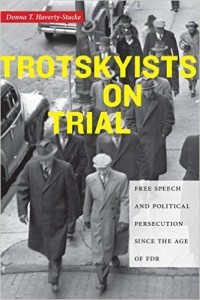

Trotskyists on Trial: Free Speech and Political Persecution Since the Age of FDR
The American war against Iraq, originally called Operation Iraqi liberation, (O.I.L.) was not fought, as we can clearly see now, to bring freedom and democracy to Iraq. But what about World War II, often called “the good war”? There were socialists indicted tried and convicted for opposing the American government’s aims in World War II, which they said was an imperialist war for markets and territories. They were falsely accused of conspiracy to overthrow the American government by force and violence, a thought crime, and imprisoned in Minnesota before the American government got involved in the war, that is, during peacetime. This was accomplished by the Roosevelt government, urged on by J Edgar Hoover and the FBI. The indictments and convictions were secured under the recently passed alien and registration act, known as the Smith Act, named after its sponsor Howard K Smith, a southern anti-labor racist democratic senator. Back then in 1941 fear was marshaled against socialists union liters who were called subversives just as fear is used now against Muslims and terrorists.
Guest – Professor Donna Haverty-Stacke, is an Associate Professor of History and Roosevelt House Faculty Associate at Hunter College, CUNY where she teaches courses in U.S. cultural, urban and labor history. She received her BA in American Studies from Georgetown University in May 1994. As the recipient of the Joseph L. Allbritton Scholarship she studied at Brasenose College, Oxford University where she earned an MSt in Historical Research in 1995 and an MLitt in Modern History in 1997. She then attended Cornell University, where she graduated with a PhD in History in May 2003.
—-
CIA Sponsored Terror, Civil Liberties, Criminalizing Dissent, Crony Capitalism, Cuba, Habeas Corpus, Human Rights, Political Prisoner, Prison Industry, Torture, War Resister
Podcast: Play in new window | Download
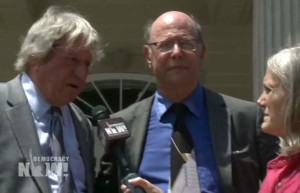
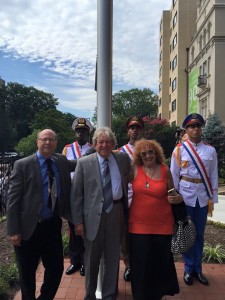
Cuban Embassy Reopens in Washington DC After 54 Years
The Cuban Embassy had closed down in 1961. It reopened on Monday July 20, 2015. The Cuban flag was flown in front of the three-story building in Washington D.C. Our own Michael Ratner and Michael Smith were there and report back. Let Cuba Be Cuba: An Embassy Re-Opens In Washington by Michael Steven Smith.
Law and Disorder Co-host Attorney Michael Ratner, President Emeritus of the Center for Constitutional Rights (CCR), a non-profit human rights litigation organization based in New York City and president of the European Center for Constitutional and Human Rights (ECCHR) based in Berlin. Ratner and CCR are currently the attorneys in the United States for publishers Julian Assange and Wikileaks. He was co-counsel in representing the Guantanamo Bay detainees in the United States Supreme Court, where, in June 2004, the court decided his clients have the right to test the legality of their detentions in court. Ratner is also a past president of the National Lawyers Guild and the author of numerous books and articles, including the books Who Killed Che? How the CIA Got Away With Murder, The Trial of Donald Rumsfeld: A Prosecution by Book, Against War with Iraq and Guantanamo: What the World Should Know, as well as a textbook on international human rights.
Law and Disorder Co-host Michael Steven Smith is the author, editor, and co-editor of many books, mostly recently Imagine: Living In A Socialist U.S.A. and “The Emerging Police State,” by William M. Kunstler. He has testified before committees of the United States Congress and the United Nations on human rights issues. Mr. Smith lives and practices law in New York City with his wife Debby, where on behalf of seriously injured persons he sues insurance companies and occasionally the New York City Police Department. Michael Smith has also organized and chaired the Left Forum.
—-
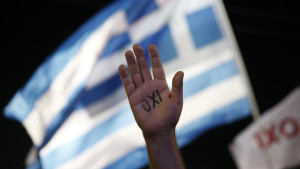

Greece Economic Crisis, More Austerity And The Plan Moving Forward
Two weeks ago we spoke with Dan Georgakas, a regular columnist for the Greek American newspaper the National Herald. Dan is the co-author of the book Detroit, I Do Mind Dying. He joins us for an update.
Guest – Dan Georgakas, regular columnist for the National Herald, the leading Greek American weekly newspaper co-author of Detroit: I Do Mind Dying and co-editor of Solidarity Forever: An Oral History of the IWW. He was a frequent contributor to now defunct Journal of the Hellenic Diaspora and the Journal of Modern Hellenism. Dan has taught at NYU, CUNY, Van Arsdale Labor College, Columbia University and University of Oklahoma.
—-

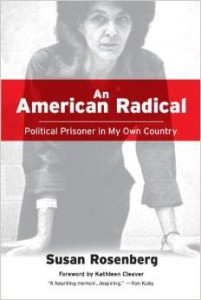
Susan Rosenberg, An American Radical Discusses President Obama’s Record Of Pardons And Commutations
Using his presidential pardon power sparingly, President Barack Obama recently ordered the release of 46 nonviolent drug offenders. Despite his calls for reducing the size of the nation’s prison population, and despite making history as the first president to visit a federal prison, his record on pardons and commutations is not great. According the U.S. Department of Justice which has recorded clemency statistics since William McKinley presidency, Obama has granted the least number of pardons in history. President Obama also has the 4th lowest number of recorded commutations.
Guest – Susan Rosenberg is a human rights and prisoners rights advocate, adjunct lecturer, communications consultant, award-winning writer, public speaker and a formerly incarcerated person. Her memoir, An American Radical, details her 16 years in federal prison as well as her conclusions about her prison experience and her past She was released from prison in 2001 through executive clemency by then President Bill Clinton. Upon her release she worked at American Jewish World Service for 12 years beginning as a writer then becoming the director of communications. Post-AJWS Susan has worked extensively in the nonprofit communications field with a focus on human rights and international development.. She is the founder of Sync It Communications, a communications-consulting group working on strategic communications with an emphasis on international human rights and criminal justice. She is also an adjunct lecturer at Hunter College and a member of the prison writing committee of PEN America. Susan has spoken widely at conferences and universities on prison issues. She is working on another book as well as other creative projects.
—-
Censorship, CIA Sponsored Terror, Civil Liberties, Criminalizing Dissent, Crony Capitalism, FBI Intrusion, Gaza, Human Rights, NSA Spying, Political Prisoner, Prosecution of the Bush Administration, Surveillance, Targeting Muslims, Truth to Power
Podcast: Play in new window | Download
Updates:
—-
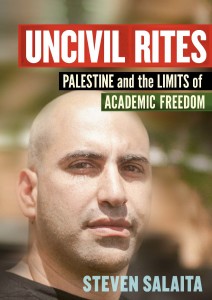
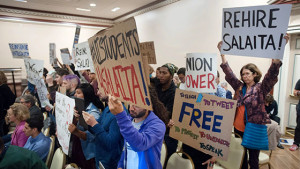
Steven Salaita Hired by American University of Beirut
In what we can view as a major victory for supporters of Palestinian human rights fired Professor Steven Salaita has been hired at the American University in Beirut in the American Studies Department. The American Association of University Professors calls Steven Salaita’s firing one of the significant violations of academic freedom in this decade. Nationwide over 5000 academics pledged to boycott the university resulting in the cancellation of dozens of scheduled talks and conferences at the University of Illinois. The University of Illinois’ action was part of a broader campus crackdown on Palestinian human rights activism that threatens both the foundational role of the university as a place of critical thinking and debate and the ability to advocate for Palestinian rights.
Guest – Professor Steven Salaita, former associate professor of English at Virginia Tech. He is the author of six books and writes frequently about Arab Americans, Palestine, Indigenous Peoples, and decolonization. His current book project is entitled Images of Arabs and Muslims in the Age of Obama.Steven grew up in Bluefield, Virginia, to a mother from Nicaragua (by way of Palestine) and a father from Madaba, Jordan. Books by Salaita, his upcoming book is titled Uncivil Rights and The Limits Of Academic Freedom by Haymarket Press.
—-
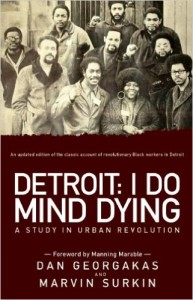
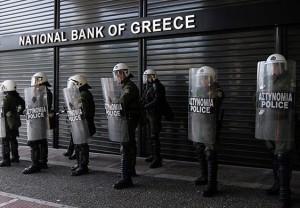
Greece Economic Crisis 2015 Update
Earlier this year we spoke with regular columnist for the National Herald Dan Georgakas about the historic election as the people of Greece voted in the anti-austerity party of Syriza, led by Alexis Tsipiras winning a 149 seats of the 300 seat Parliament. Today, the economic and political state in Greece is in a tremendous state of flux. Will Greece leave the EU and the Eurozone? Will its debt be written down and restructured?
Guest – Dan Georgakas, regular columnist for the National Herald, the leading Greek American weekly newspapero co-author of Detroit: I Do Mind Dying and coeditor of Solidarity Forever: An Oral History of the IWW. He was a frequent contributor to now defunct Journal of the Hellenic Diaspora and the Journal of Modern Hellenism. Dan has taught at NYU, CUNY, Van Arsdale Labor College, Columbia University and University of Oklahoma.
—————————————-
CIA Sponsored Terror, Civil Liberties, Criminalizing Dissent, Crony Capitalism, Habeas Corpus, Human Rights, Iraq War, Military Tribunal, Political Prisoner, Prison Industry, Targeting Muslims, Truth to Power, War Resister
Podcast: Play in new window | Download
Updates:
- FBI: If You Give Us Assata Shakur, We’ll Free The Cuban Five
- Michael Ratner: Massive CIW March St. Petersburg, Florida 2015
- Alliance For Fair Food
—-
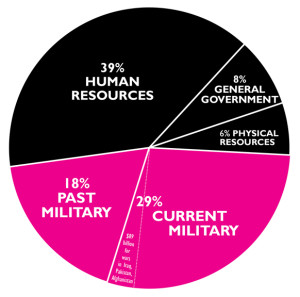
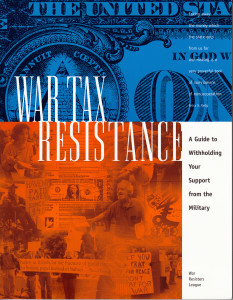
War Tax Resistance
As April 15 draws near, some Americans engage in the practice of war tax resistance, refusing to pay some or all of their federal income tax. It’s an act of civil disobedience with a proud history in this country. Notable war tax resisters included Henry David Thoreau who refused to pay his poll tax during the Mexican-American war. In the 1960s and 70s, many Vietnam war protesters engaged in the practice, including Norman Mailer, Howard Zinn, James Baldwin and Joan Baez. While individuals refusing to pay war taxes cite the refusal as a moral imperative-even citing international law to bolster this assertion—it’s not surprising that the Internal Revenue Service considers the refusal to pay such taxes as illegal.
Ruth Benn:
- In war tax resistance we tend to use the War Resisters League chart where your income tax money really goes and the calculations from the War Resisters League over the years have been around 50 percent.
- About 27 percent is current military so that’s paying for the wars and its buying the weapons for the next wars and all of those things that the Pentagon does.
- The “past military” is mainly for the debt and then the money that’s set aside for veterans.
- The nuclear weapons program which they are increasing over the coming 10 years, modernizing weapons and modernizing delivery systems. Obama is increasing that money for the nuclear weapons. That’s in the Department of Energy.
- We have the Department of Homeland Security. That is a lot of armed people also. The TSA, the militarization of the border. Homeland Security is giving those grants to local communities in the U.S. that are getting these military weapons.
- We have 500 billion this year for veterans and past military. That’s only going to add up.
- Basically, (war tax resistance) is similar to conscientious objection in terms of people who refuse to go into the military or refused the draft. So this is a refusal to have my tax dollars drafted. A refusal to pay income taxes that go into this pie of the military budget.
- There was a particular tax put on people in WW2. A stamp that people had to buy that was on their cars that supported war.
- (Famous tax resisters) We tend to go back to Henry David Thoreau of course with his one dollar that resulted in on the duty of civil disobedience.
- I always say going throughout history taxes first tend to be put on people because somebody wants to fight somebody. A government wants to go to war, that’s centuries back.
- The Vietnam War of course was the biggest time for tax resistance when it really was a strong part of the peace movement.
- The campaign during Vietnam to resist the telephone tax. A tax that was put on and raised during Vietnam. It was put on to 10 percent just to pay for the wars.
- People would owe 7.00 dollars in phone tax and some of them had their houses seized, some had their bicycles and cars seized.
- Within the network of war tax resisters and I hesitate to call it a movement these days, there are people who do a whole range of things. There are people who live on a very low income which is a legal way to do it. The cut off for filing and owing taxes is around 10 thousand dollars for a single person.
- There are people who are more adept at using credits and deductions to lower their taxable income.
- I think in ’87 I started very consistently filing and refusing to pay. You get a lot of letters. I have files and files of collection letters, of course they add up interest and penalties.
- Now I’m self-employed, the IRS can do things like garnish salaries. Over the years I figured out how to live in a way that makes it harder for them to collect. Not that they couldn’t make my life difficult.
- Mostly the IRS would like to get the money than prosecute people.
- I got active in the peace movement with the American Friends Service Committee. I’m not a Quaker myself but war tax resistance tends to known pretty well in the Quaker community.
- Usually you’ve been active (in peace movement) for a while and then you go . . oh, I’m paying for this. I’m paying for what I’m fighting against.
- nwtrcc.org
- War Tax Resisters Guide – The Book.
Guest – Ruth Benn, Coordinator of the National War Tax Resistance Coordinating Committee. Along with Ed Hedemann, she co-edited the fourth and fifth editions of the book “War Tax Resistance: A Guide to Withholding Your Support from the Military, published by the War Resisters League.”
—–
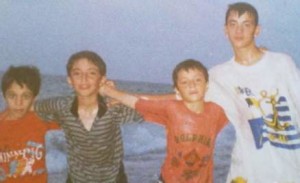
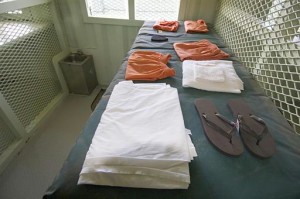
Life After Guantanamo: A Father And Son’s Story
In the weeks after September 11, 2001, the United States gave bundles of cash to Afghan war lords and the Pakistan government to assist in capturing suspected Taliban and Al-Qaeda fighters. Hundreds of men were turned over to U.S. custody often without evidence. This was an unfortunate starting point of how human lives were destroyed to as some suggest, justify an illegal war launched by the Bush Administration. Center for Constitutional Rights, senior staff attorney Pardiss Kebriaei’s Harper’s Magazine article titled Life After Guantanamo: A Father and Son’s Story traces the human toll of how her clients were wrongly imprisoned. After being picked up in Pakistan, sent back to Afghanistan, detained in Kandahar, Abdul Nasser Khantumani and his son Muhammed were interrogated by the United States and sent to Guantanamo Bay Prison in Cuba.
Attorney Pardiss Kebriaei:
- I started in 2007 and it took me year to be able to go down to the base. I went to down in mid 2008, that was the first time I met Muhammad.
- Muhammed was the son, he was a teenager and he was taken into U.S. custody. By the time I met him, he had been at Guantanamo for 6 years. 6 years without charge.
- What I say in the piece is he started breaking down, really kind of cracking in 2005.
- He was saying things like – I don’t care if I’m here another 5 years, another 10 years, I’m never getting out.
- He’d been held in solitary confinement for 2 years at that point, and there was this additional aspect of the way his relationship with his father was used to traumatize him.
- They were captured together, transferred to Guantanamo together but then, pretty much held apart in prison.
- In November of 2008 we met then in December he cut his wrists.
- He doesn’t call it suicide because he didn’t want to die. He just didn’t know what to do.
- We filed an emergency motion with the court, asking the court to move him out of solitary to get him close to his father, to do something.
- The latest hunger strike in 2013, they denied it was happening.
- Muhammed was young and he was really vocal and loud about his torture. I remember hearing him yell and scream.
- Abdul Nasser, his pain was quieter. There was a different kind of pain that left a wife behind or children behind. Abdul Nassar thought a lot about the rest of his family.
- We know that the CIA was paying millions of the dollars to the Pakistani government and Afghani war lords to profile and turn people over, basically sell them into U.S. custody.
- They came into U.S. hands because they profiled and unilaterally deemed by President Bush and Rumsfeld to be enemy combatants without any real evidence of wrongdoing.
- We know that happened and its not just groups like CCR saying that.
- The way that decisions are made and people are transferred (from Guantanamo Bay Prison) is such a lottery.
- I think Abdul Nassar appeared to be more of a burden frankly to them, because he was older and in ill health. They didn’t take him. They wanted a younger guy who they thought would be easier to resettle.
- Part of the point of the story was to shed light on just what life is like after Guantanamo.
- Abdul Nassar has not seen his wife since 2001. He hasn’t seen his other children since 2001. He hasn’t seen Muhammed since that day in 2009.
- http://ccrjustice.org/reunificationafterguantanamo
Guest – Pardiss Kebriaei, Senior staff attorney with the Center for Constitutional Rights, which she joined in 2007. Her work focuses on challenging government abuses post-9/11, including in the areas of “targeted killing“ and unjust detentions at Guantanamo and in the federal system. She is lead counsel for CCR in Al-Aulaqi v. Panetta, which seeks accountability for the killing of three American citizens in U.S. drone strikes in Yemen, and was counsel in Al-Aulaqi v. Obama, which challenged the authorization for the targeting of an American citizen placed on government “kill lists.” She represents men currently and formerly detained at Guantanamo in their efforts for release and reintegration, and represented the families of two men who died at the base in their lawsuit for accountability, Al-Zahrani v. Rumsfeld. She also represents Fahad Hashmi, who pled to material support for terrorism after years in pre-trial solitary confinement and Special Administrative Measures, in his efforts to challenge his continuing solitary confinement in a federal “supermax” prison.
——————————————————

Is Law and Disorder important to you? Consider a tax deductible donation to the show. By making a donation, you’ll be helping Law and Disorder continue to provide the consistent high quality content on some of the most pressing legal, human rights and international issues. This radio show is now a sponsored project of Fractured Atlas, a non-profit arts service organization. Contributions for the charitable purposes of Law and Disorder must be made payable to Fractured Atlas only and are tax-deductible to the extent permitted by law.



























